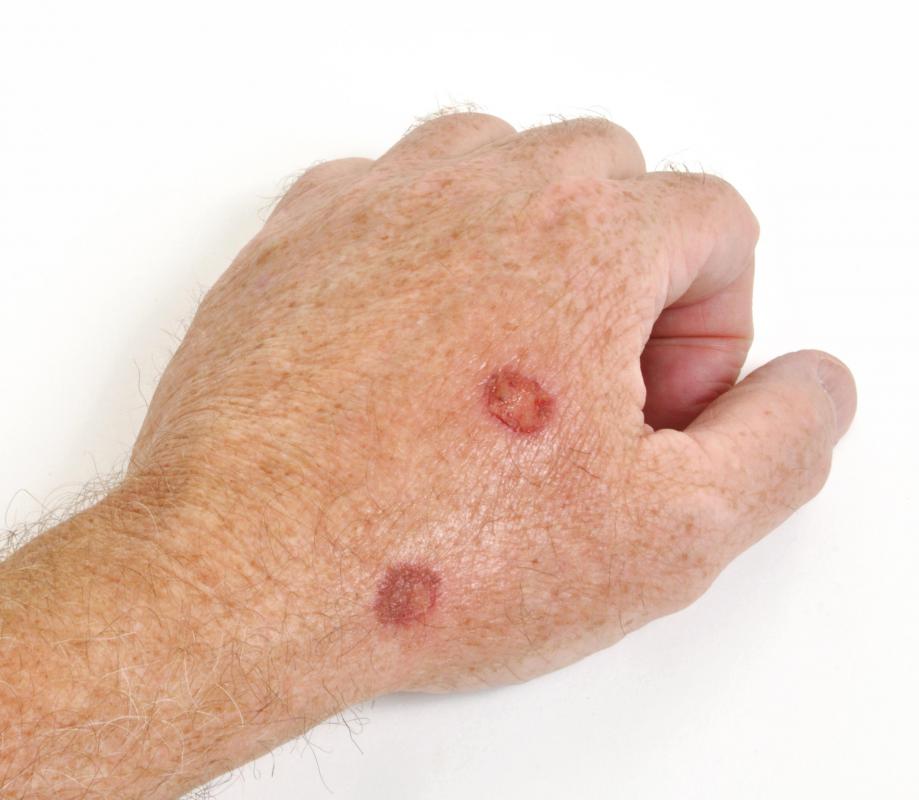At TheHealthBoard, we're committed to delivering accurate, trustworthy information. Our expert-authored content is rigorously fact-checked and sourced from credible authorities. Discover how we uphold the highest standards in providing you with reliable knowledge.
What is the Connection Between Itching and Skin Cancer?
Itching and skin cancer may be closely connected in some cases. Cutaneous T-cell lymphoma, for example, is a blood cancer that can also attack the skin. When this happens, itching symptoms may persist throughout the body. Squamous cell carcinoma is a skin cancer that may cause itching in large, red patches of the skin. It is important to note that itching is not always present with skin cancer — melanoma and basal cell carcinoma are two types of skin cancer that often do not cause itching.
Cutaneous T-cell lymphoma (CTCL) is a general term that refers to many lymphomas of the skin. It is specifically a cancer involving the T-lymphocytes, or white blood cells, and also impairs the blood and skin. CTCL is a rare disease, and doctors often mistake it for eczema or dermatitis because patients routinely complain of itchy patches of flat, red and scaly skin.

CTCL may occur in plaque or tumor phases as well. A plaque is a thick, raised skin lesion, while a tumor is a larger lesion that may ulcerate. The most common variation of CTCL is mycosis fungoides, and Sezary syndrome is the advanced stage of this disease. Patients with Sezary syndrome typically have reddened skin that is hot, sore, flaking and itchy.

Itching and skin cancer are also connected in many cases of squamous cell carcinoma in situ. This is known as Bowen’s disease, named after the doctor who initially discovered it in the early 1900s. The term "in situ" indicates the skin cancer is in surface form and has not grown inward through the layers of skin. Squamous cell carcinomas may occur anywhere on the body, including mucous membranes and genitals. The most common areas, however, are those frequently exposed to the sun, including legs, arms, hands, lower lip and outer rim of the ear.

Squamous cell carcinoma in situ usually begins as a red, scaly patch. Some spots are brown and resemble melanoma, and the patches often crust or ooze and itch. A biopsy is usually done to confirm diagnosis. People at the greatest risk of developing squamous cell carcinoma are those with blond or red hair, fair skin, and gray, green or blue eyes. Those people with outdoor occupations or who spend excessive leisure time in the sun are in particular danger. Additional risk factors include many severe sunburns early in life, arsenic or chemical exposure and advanced age.
Scaling, itching and skin cancer often appear together. One particular sign is a skin sore that does not heal or abruptly changes in appearance. An existing sore that bleeds, itches or becomes inflamed is another likely symptom of cancer.

Diseases in which itching and skin cancer are typically not linked include melanoma and basal cell carcinoma. Melanoma is usually painless and likely to be marked by a change in the size, color, shape or feel of an existing mole. Basal cell carcinoma is one of the most common skin cancers and may look only slightly different from normal skin. This may be characterized by a skin bump or growth that is waxy, white, light pink or brown.
AS FEATURED ON:
AS FEATURED ON:
















Discussion Comments
@KoiwiGal - Rather than insisting on a biopsy, if you are worried about skin cancer, I would insist on seeing a skin specialist. The problem is that the average doctor isn't going to be well trained in identifying skin cancer. It comes in a wide variety of types and symptoms and they aren't all obvious, especially the rare ones.
A skin specialist will know what is serious and needs a biopsy and what isn't. If you get what is called a mole map, they will even be able to track changes in your skin over time to help them to further identify problems.
@clintflint - It's also important for people to realize that sometimes existing moles can become cancerous, or that a cancer can be there on your skin for a while. My mother had a mole for several years that I kept insisting that she mention to a doctor, but every time she did, they would dismiss it. It was relatively small, but had different colors and it was raised.
Finally, she saw a doctor who decided it was better to be safe than sorry and he took a biopsy. And it turned out that it was cancer and that at any moment it could have metastasized and killed her.
If she had dismissed it as something that had "always been there" she would never have gotten it checked.
I think if you look at pictures of skin cancer moles and they look at all similar to something you have, or if you have other symptoms like itching or redness, you should insist on a biopsy.
Skin cancer is unfortunately very common. I've known several people who have had to have melanomas removed, including a friend of a friend who ended up having to amputate a toe to remove a cancer.
The signs of skin cancer are wide ranging and easy to dismiss. If you've got anything unusual on your skin that has started recently, but continued for more than a couple of weeks, you should get it checked out. That goes double if it grows at all in that time.
Post your comments